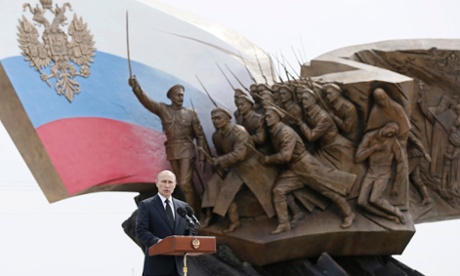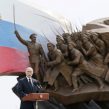
Putin Re-Interprets Russia’s Participation in the First World War
Publication: Eurasia Daily Monitor Volume: 11 Issue: 143
By:

On August 1, at Moscow’s Poklonnaya Hill military memorial, President Vladimir Putin inaugurated a monument to Russian soldiers who fought in the First World War. On the hundredth anniversary of that war’s outbreak, the Kremlin has decided retroactively to honor those soldiers as heroes, and the Russian Empire’s participation in that war as a glorious part of the national history (kremlin.ru, August 1).
Russia’s post-Soviet historiography found it difficult to integrate Tsarist Russia’s participation in the First World War into a national-heroic narrative. Although Russia fought that war (1914–1917) in pursuit of far-reaching territorial conquests, and backed by one group of European powers, the war resulted in Russia’s collapse. The Soviet victory in the Second World War with its attendant mythology left little room for the disastrous First War in Russia’s national remembrance. Cultivating the history of this war (along with that of White forces in the Russian Civil War of 1918–1920) became fashionable in Russian nationalist circles recently. Colonel Igor Girkin/Strelkov became known for organizing re-enactments of battles from that time (Ukrainska Pravda, April 30).
Putin’s rehabilitation of the Russian Empire and, recently, Greater-Russia nationalism, necessitated (as he said in his speech) “restoring the historical truth about the First World War” in that spirit. Putin’s August 1 speech outlines a new, state-approved, glorifying interpretation of Russia’s involvement in the First World War. Along with this, Putin resorts to a stab-in-the-back explanation of Tsarist Russia’s defeat and collapse.
According to Putin, “we are re-establishing today the unbroken continuity of our history,” incorporating the First World War’s “sacred memory” into the official accounts of Russia’s history. Politically, the homage on Poklonnaya Hill constitutes a gesture to Russia’s nationalist circles. These have become a major component of the pro-Putin coalition during his third presidential term and the war against Ukraine.
Tsarist Russia was among the First World War’s initiators. It had not been attacked or threatened by any power, until Russia itself entered the war by invading Germany and Austria-Hungary in August 1914. Within three years, Russia forfeited its goals of further territorial expansion, ended up defeated and lost much of its European empire. Putin’s speech attempts to explain this chain of events.
1. “Russia was compelled to enter the First World War.” This is the opening sentence of the speech, but it lacks a follow-up. Putin does not explain who compelled Russia to enter the war, why or how.
2. In the Austrian-Serbian conflict, “Russia had to take up the challenge by defending the fraternal Slavic people.” Putin does not present this as the thinking of Russia’s authorities and society at that time, but as a valid axiom, implicitly reflecting the Kremlin’s current ambitions.
3. “Russia fulfilled her allied obligations. Russia’s offensives into [eastern] Prussia and into [Austria’s eastern] Galicia disrupted the enemy’s plans, allowed the allies to hold the front and defend Paris.” Putin does not explain those “obligations,” does not acknowledge the devastation wrought on Prussia during the brief invasion (which ended with Russia’s defeats at Tannenberg in late August and the Masurian Lakes in mid-September 1914), and does not mention the brutal Russification campaign against Ukrainians in Galicia during the occupation of that province (Russian armies were driven out from almost all of Galicia in the summer of 1915) (Mark Von Hagen, War in a European Borderland: Occupations and Occupation Plans in Galicia and Ukraine, 1914–1918, Seattle: University of Washington Press, 2007).
4. Putin passes over in silence the defeats that forced Imperial Russia to abandon its territories in Poland, Lithuania and Kurland (western part of present-day Latvia) from May through November 1915. The Russian army never recovered from those defeats. General Aleksei Brusilov’s counteroffensive (June–September 1916), costing more than one million Russian casualties, fell vastly short of its goal of recapturing lost imperial territories. In July 1917 a second Brusilov offensive (also known as the Kerensky offensive) turned into a disastrous retreat in Ukraine (Norman Stone, The Eastern Front 1914–1917, Penguin Global, 2004).
5. Characterizing the first Brusilov offensive as “legendary,” Putin builds the stab-in-the back theory on that legend: “That victory was stolen from the country. It was stolen by those who called for the defeat of their own fatherland and its army, sowed discord within Russia, and lunged to grab power, betraying the national interests.” Putin is alluding, of course, to the Bolsheviks. He rejects Soviet historiography’s thesis that Russia participated in an “imperialist war.” Instead, “we restore the historical truth” about that war.
Had victory not been “stolen,” i.e. had Tsarist Russia staggered through the war and joined its Entente allies at the peace conference, it might well have attained its war aims of conquest. Annexing Eastern Galicia outright to Russia (based on denial of the Ukrainian national identity) was among the officially declared war aims in 1914. In March–April 1915, Britain and France approved Russia’s annexation of Istanbul and the Bosporus and Dardanelles Straits, in the event of a “common victory” in the war—i.e., provided that Russia did not abandon the coalition. The Entente governments feared already at that stage that a weakened Russia could withdraw from the war. In February 1917, driven by the same fear, the French Republic granted the moribund Tsarist Russia a free hand to draw the empire’s western borders at the war’s end.
Putin’s version of history does not acknowledge Russia’s economic and military inferiority as the main cause of its collapse in that war. White Russian generals, whose memoirs clearly inspired Putin’s stab-in-the-back thesis, did nevertheless acknowledge Russia’s relative backwardness to account for the ultimate collapse.
There is no trace of human compassion for the Russian dead and wounded in Putin’s account of the First World War. The staggering numbers go unmentioned in his speech. Estimates of Russia’s casualties hover around 5 million to 6 million in battle casualties alone, up to 1917 (approximations are due to Russia’s defective statistics at that time). Putin’s speech simply extols the Russian soldier’s capacity for anonymous self-sacrifice on a mass scale. Amid its ongoing war against Ukraine, the Kremlin is reaching into history to recuperate yet another militarist narrative for popular consumption.




